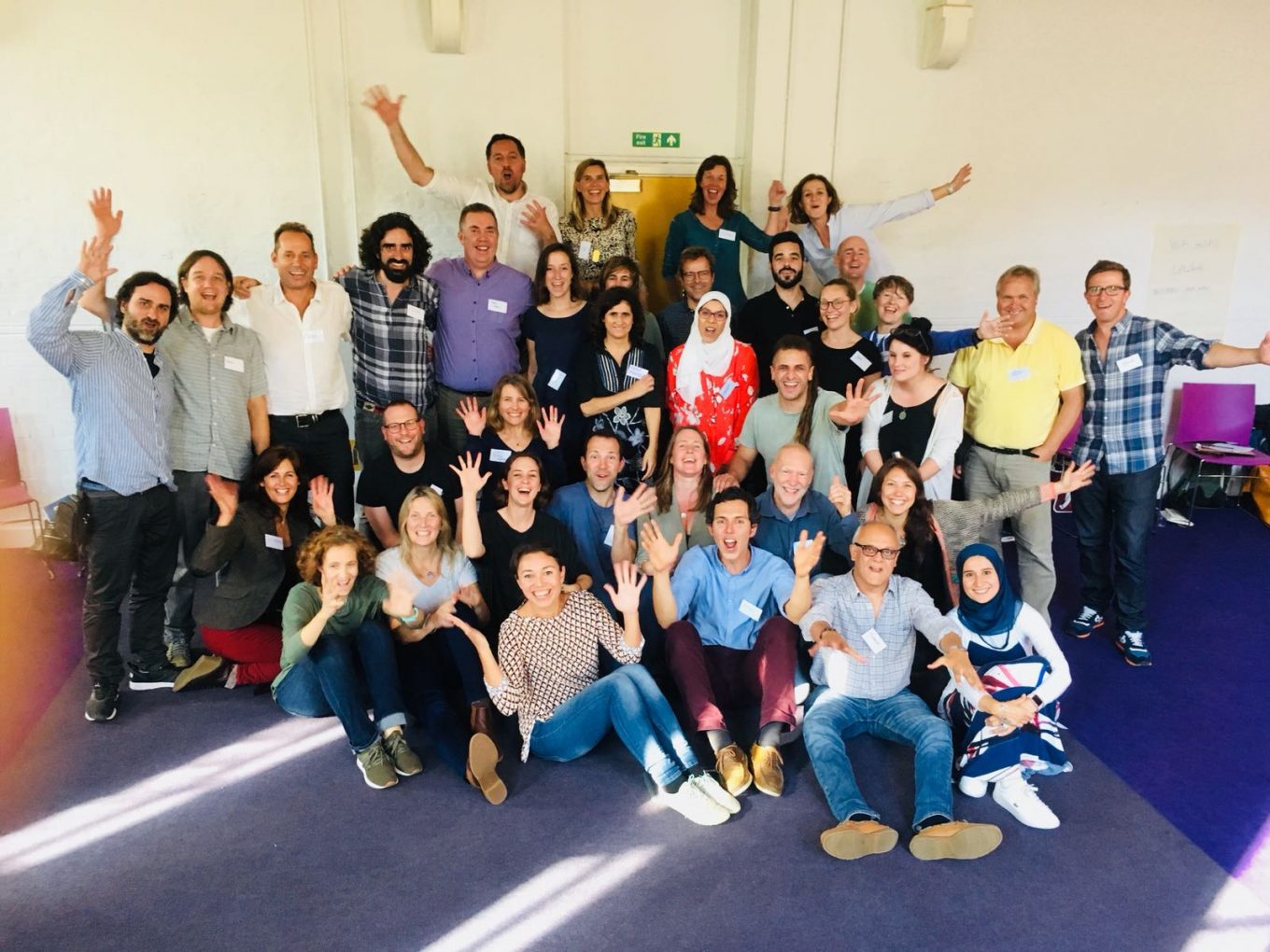
I recently participated in Reinventing Organisations, an experiential workshop, which was organised by the Kairos Project on October 5th, 2018. The workshop was led by a group of Chilean facilitators, that included, amongst others, Diego Cuadra, Ignacio Cespedes, Paul Jackson, Manual Prieto Mendez, Alvaro Perez, Georgina Fernandez and Alexandra Montgomery.Kairos Project is an organisation that aims to create an international network of Kairos Project Hubs. Being an admirer of Frederic Laloux for a long time, and also of Ken Wilber’s work around spiral dynamics, I was super eager to go, and curious to know what it was meant by “experiential journey”. Little did I know how the workshop would surpass all my expectations.
At 9 o’clock, there we were, a bunch of enthusiastic and curious people, chatting with each other, eager to know and learn more about what it means to reinvent organisations. If most of us had read Frederic Laloux’s book, we were interested in learning more, and finding ways to put it into practice in our organisations. In particular our interest was around the new management paradigm where values of wholeness, evolutionary purpose and self-management come to the forefront. I crossed with Diego Cuadra, one of the facilitators that I’d recently interviewed, and he warned me with a smile that there would be dancing! I looked around and observed in anticipation how a team of Chilean facilitators was setting up musical instruments and sound equipment.
So, there we were, all seated in a large circle, and after a welcoming message from Frederic, the Chilean team announced how we would soon embark on an embodied journey of 3000 years of history.
Frederic Laloux published his book “reinventing organisations” in 2016. Inspired by Don Beck’s spiral dynamics, and Integral Theory, Frederic Laloux adopts these theoretical frameworks to provide the reader with an overview of all kinds of organisations throughout time. The book describes how every time humanity has shifted to a new stage of consciousness, it has also invented a radically more productive organizational model. Could it be that we are facing another critical juncture today? That we are on the verge of a new leap again?
As Diego had reminded me in a previous interview: “According to various social sciences, the development of humanity has not been linear. It has been observed that in some specific moments of history we have made “evolutionary leaps” that made us advance faster than in previous years. These leaps have occurred at a time when the prevailing ways / strategies to solve the challenges of humanity were not able to continue to do so effectively, which has given space to new forms that if previously were seen as incipient and alternative, finally became the new prevailing forms.”
The purpose of the workshop, mentioned Diego, was to make people “ experiencing and observing individually each one of the energies of the 5 main evolutionary stages to become aware of how integrated they are in our current way of functioning both individually and collectively.”
The workshop adopted a linear setup, throughout which we experienced all kinds of different organisations, in group exercises that recreated their core characteristics. Throughout the day there wasn’t much time to talk, but rather space for meditative absorption, and reflection through writing. Everything was designed to take us out of our heads, and more into the body, through dance, music and embodiment. The idea was to open up to other dimensions expanding our awareness.
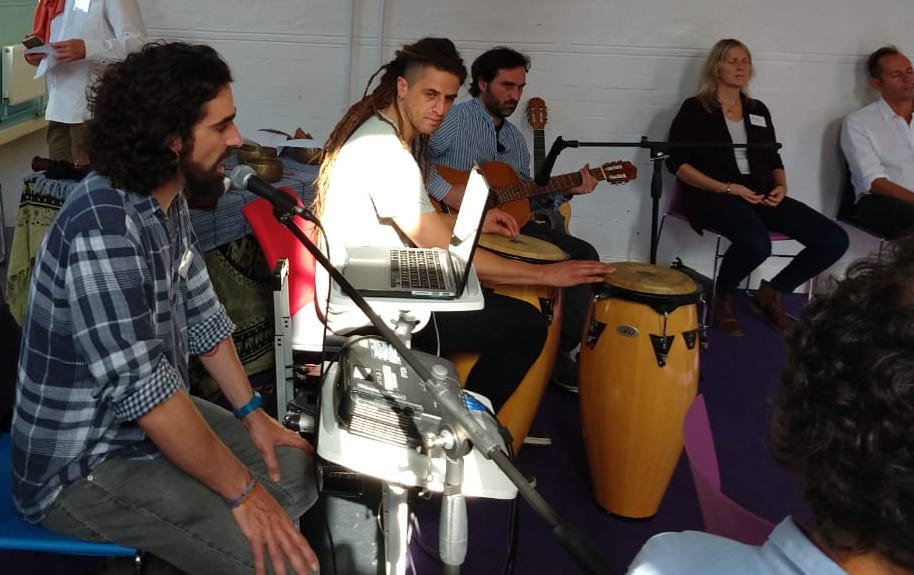
The first exercise, made us experience “tribal” (red) organisations. As we walked along the hall, I observed how three people had been picked up randomly by the facilitators to become the leaders of three tribes. Each had a totem, and we were incited to choose one of them to be our leader. We were to imitate its hurls and gestures. The idea was to frighten the other tribes, and express power and energy. Curiously, something deeply engrained in our system of today came up, as only 3 men, and most of the women, chose the woman leader. I picked the woman leader and there I was part of a bunch of people making gestures to frighten the other two tribes. Then we sat, and quietly reflected how much of that energy was still prevalent in our organisation today. That would happen various times, that moment of reflection, would repeatedly take us back to what is present today, in ourselves and our organisations.
The second journey had to do with the type of organisations which resulted from the invention of agriculture. According to the colour code of Laloux, these are yellow organisations. Manu, a musician and performer, led us on that voyage. From the beginning, through movement and musical sound there was a feeling of being part of something bigger then us, deeply hierarchical yes, but musical … We had moved from the hurls and bare power of the red stage, to the feeling of harmony resulting from a group … In a circle, we were like a musical machine, participating in a common effort, for the benefit of all. But as we chanted and made movements as if harvesting the fields there was no space for rebels or mistakes. All participants making mistakes were punished by ostracism. You would have to exit the musical circle, and hold books in both hands, as a physical punishment. Since I was not outcast, my experience evoked my youthful days as a musician playing in an orchestra, and the beautiful feelings of being part of a collective, where the dissolution of our ego into a whole Self, produced bliss and beauty.
After reflecting by writing on a sheet, about the merits and flaws of such a system of organisation, and how much of it is still prevalent in our workplace, or the organisations we belong to, we quickly moved to the third exercise. There was no time to lose, in this fast-paced journey. In 3 hours we were to cover 3000 years.
So, after a quick break, we landed in an atmosphere that evoked the nineties and 2000s. Or even today’s time! Paradoxically, the experience was exciting, fun, creative… and filled with losers and winners. The exercise played with the idea of a “start-up competition” where there was no time to lose as “time is money”. The fastest and smartest would win. I thought how this mind set of hurriedness still dominates our fast days particularly in cities like London. Even if your interests are now more connected with personal growth, the ingrained mentality of doing stuff all the time in order to “be happy” and “evolve” still hangs over most of our heads.
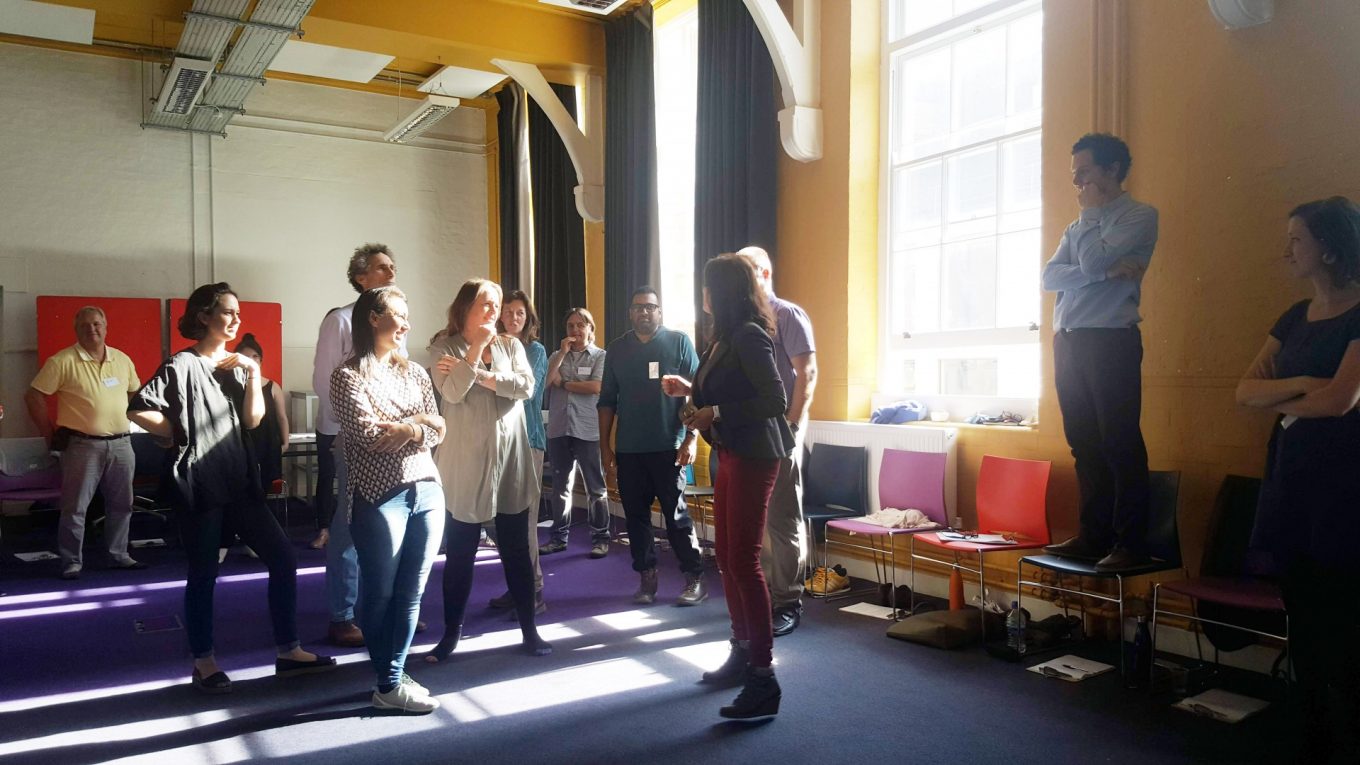
In the exercise, we were divided into groups of five people, with the task of building a machine… a robot lover that wouldn’t whine, and that would be always there ready to cuddle, engage in deep conversation, have sex. Then, there was a different group, the one of the consumers…
I was lucky to land up in a group where one guy quickly stood up as a leader. He led us to send an informer to the consumer research group to find out the characteristics of the lover robot. When he returned, we built our “lovers e-machine”. “Move on, move on”, said the facilitator, “we have no time”… Playfully, each group decided on a seller, who would present their product to the audience… To the delight of the group, someone announced how their product had the most perfect algorithms and latest machine learning technologies… keywords tainting our days today. We voted for the best, and the winning team was awarded a prize – a wonderful chocolate bar! The others…were losers.
How much of this energy, this type of organisation, was there, in our organisation? What were its merits? What about its negatives? I thought how fun and creative the exercise had been, and how competitive I’d felt, wishing for our group to win. Again, the question, was to find a balance. And balance, is a dynamic quality, not static. It is adapted to what is needed in the moment. As one develops a fine intuition, and embodied awareness of what is needed, one can juggle between different instruments to make things happen… or not… according to the needs of your organisation.
We moved then to the green journey, corresponding to the green stage of evolution in the Laloux book. The seeds of green values in organisations began a long time ago, with the French revolution, and its ideals of equality, freedom and liberty. Some of its subsequent developments were the 1968 student revolution, the hippie revolution, civil rights movements, and so on. How did such political movements, influence organisations? Frederic speaks about “green organisations” as the ones that welcome the expression of emotions and authenticity in the work place. The organisation is seen as a benevolent and deeply democratic family.
Paul led the green exercise, which enticed us into a journey of self-discovery. We had to walk around the room, looking into each other’s eyes, while really taking the time to intimately know and meet, another human… another soul. How much time would you engage in such a journey? At a certain point, we were to embrace each other, in a large circle. But some of the facilitators were taking too much time on the process of talking and bonding with others… To balance how much the energy should be spent connecting with the individual, versus the one of working towards a common effort, was the issue here. At least afterwards, reflecting on the exercise, that was what struck me. If it was amazing to know each other authentically, and to heal the “inner child”, balance was, again required. Or maybe not, as in a future with automation and machine learning, doing is not so needed anymore.
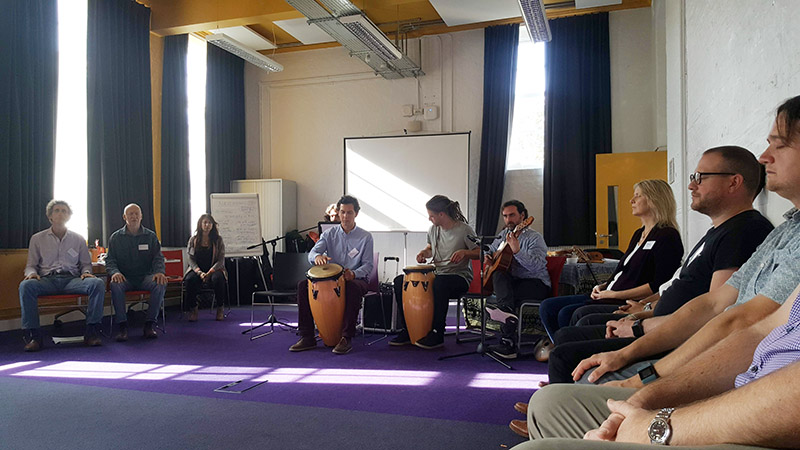
Finally, we were to dive into the teal journey. Considered the most evolved type of organisation, this was the one all of us were aiming for. In theory, a teal organisation is an emerging organisational paradigm that advocates a level of consciousness including all previous world views within the operations of an organisation. These are characterised by self-organisation and self-management, and a decentralised structure consisting of small teams that take responsibility for their own governance and for how they interact with other parts of the organisation.
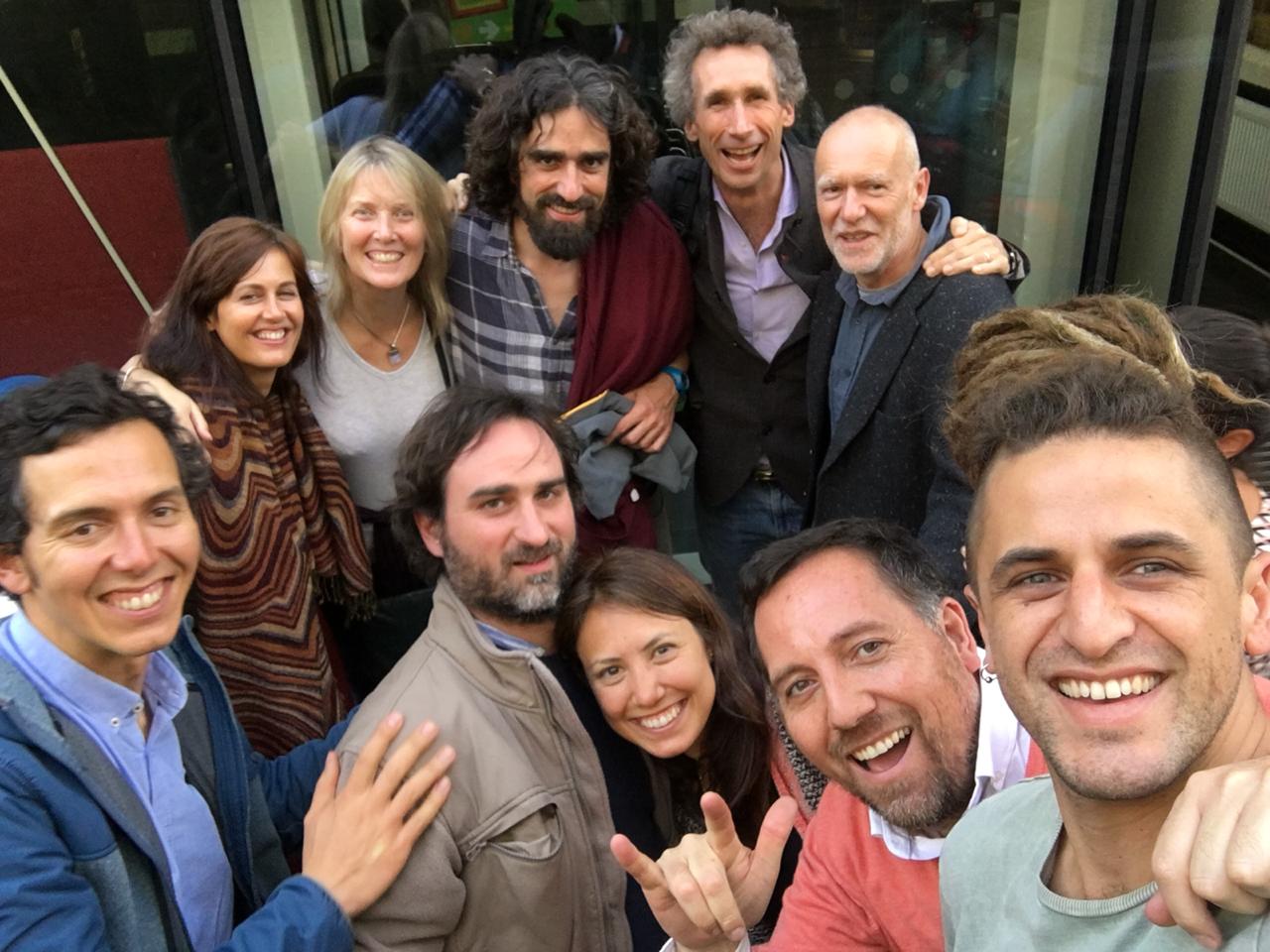
I was curious to know how the Chilean team had designed the exercise. We each had a stick, that symbolised our purpose. And we were supposed to find another soul that would join us in that purpose, and then other souls, and then more and more souls. As I danced alone, holding my stick and tapping into my soul purpose, I stopped. And there, in that moment, I found my “soul mate” for this journey. His name was Robin, and we joined our sticks, to quickly mate with two other souls. Soon, we were a group of people connected and dancing with sticks. The metaphor couldn’t be better of what an organization could be: As we danced, we were either feeling tension and sometimes even losing our sticks, or quickly flow swiftly together … The exercise was again fun, but more profound.
There, I could see and unveil all the metaphors of the previous stages … the group and the individual, the moments of tension and rupture, and the picking up of the flow…What was different though, was that there was also wholeness and compassion for everyone, and no one was left out.
After quiet reflection, we used technology to investigate the positives and negatives of each stage, and to reflect on how much of teal, green, orange, yellow, red, existed in our organisations. And after a group hug and collective picture, we all left, to fast London and busy schedules, holding in our hearts, an embodied vision for the world of the future.

Maria Fonseca is the Editor and Infographic Artist for IntelligentHQ. She is also a thought leader writing about social innovation, sharing economy, social business, and the commons. Aside her work for IntelligentHQ, Maria Fonseca is a visual artist and filmmaker that has exhibited widely in international events such as Manifesta 5, Sao Paulo Biennial, Photo Espana, Moderna Museet in Stockholm, Joshibi University and many others. She concluded her PhD on essayistic filmmaking , taken at University of Westminster in London and is preparing her post doc that will explore the links between creativity and the sharing economy.




























